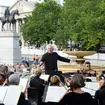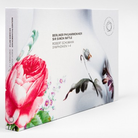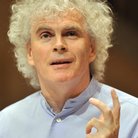Sir Simon Rattle: Here To Stay!
Sitting on his office sofa at the Berlin Philharmonie and drinking his tea, how do you ask one of the world’s greatest conductors if, two years into his stewardship of one of the world’s greatest orchestras, his career has hit the buffers?
“Just ask,” replies Sir Simon Rattle, helpfully. In a few moments I’ll know whether this has been the world’s shortest interview.
“Well,” Classic FM begins, “the weekend papers were full of the German critic Axel Brüggermann accusing you of being another Karajan [the Berlin Philharmonic Orchestra’s legendary, dictatorial former conductor], more interested in the orchestra’s public profile, romping expressively on the podium while the musicians play on inconsequentially and producing music that is boring and insipid. How do you plead?”
Classic FM has learned he likes to gather his thoughts before speaking and that you’ll miss a good quote if you break the numbing silence. So patience is employed, the only sound being the hum of the morning traffic in nearby Potsdamer Platz and the skateboards clattering on the Philharmonie’s walkways.
At last he speaks: “In Germany, to be a critic is to be kritisch, not necessarily to be freundlisch. Strangely, the critics seem to have alighted on the performances we did here of Cosí Fan Tutte. All of us felt they were the best thing we’d done in two years, so that was interesting. I have to remember there is always this cycle of euphoria followed by damnation. I just wish it would settle in the middle.”
I have a feeling that at the ripe old age of 48, Simon Rattle has heard it all before but his measured response must surely have been encouraged by the events I witnessed the previous evening. In a scene reminiscent of the Proms (it was actually just a regular subscription concert) the audience demanded Rattle take his final bow alone. If he was to get home that night, this modest maestro knew he’d better do as they wanted. His entrance was met with wild applause from the greying BPO subscribers and younger ticket holders – a show of support for their conductor, fresh from his Brüggermann bruising, but also thanks for a great evening’s music.
Beethoven’s Piano Concerto No.1, Bach’s Brandenburg Concerto No.1 and Schoenberg’s arrangement for orchestra of Brahms’s Piano Quartet No.1 – Rattle couldn’t have devised a more Berlin-friendly programme. Not that he could have foreseen Brüggermann’s attack.
“With an orchestra like this you would be a fool not to explore these pieces,” Rattle tells me. “As you heard last night, the orchestra is willing to go anywhere with their repertoire.”
In concert it’s clear he’s enjoying leading them. Rattle leans into the orchestra, swooping low over the strings, eking out delicate pianissimos from the woodwind, commanding basses and brass with stabbing fingers and scything the air with sweeping arms that gather up the orchestra to hurl huge blocks of sound to the back of the hall. But he’d be the last to deny his players’ instinctive musicianship, too.
“The orchestra takes things very seriously and goes into the music very deeply. I know when the players understand the music by the way they move. It’s impossible not to be caught up in their physical response. Fortunately, I’m not very restrained myself.”
If this is what Rattle’s critics dismiss as “expressive romping”, he’s not about to stop.
“The players are clear about what works and when things don’t, they say so. We’re bringing an enormous amount to each other.” From Rattle comes new repertoire. “They’ve been stunned to find pieces they don’t know,” he says, among them Messiaen’s Éclairs sur l’au-delà, which Rattle and the BPO are releasing on disc.
Until this interview, the only Messiaen Classic FM knew was the Turangalîla Symphonie, a 10-movement work lasting an hour and a half. Add the fact that Messiaen is (or was – he died in 1992) French and one of the heroes of modern music and the piece sounds one helluva marathon. It isn’t. Turangalîla Symphonie is one of the most accessible pieces of 20th century music you’ll hear: luminous, bewitching and stunningly imaginative. Enjoy Rattle’s 1986 performance, with his old band the CBSO, on EMI 747 4638.
So imagine Classic FM’s disappointment on being left cold by a recording, with Myung-Whun Chung, of Messiaen’s Éclairs sur l’au-delà, which had been heard prior to the interview with Rattle. Its cacophony of janglings and apparently random sounds punctuated by frustratingly brief glimpses of Messiaen-ic loveliness, were hard-going indeed.
Time for another awkward question: “Nicholas Kenyon reports in his biography of you [Simon Rattle: from Birmingham to Berlin – Faber, ISBN 0-571-21244-1] that your first experience of Éclairs sur l’au-delà was one of the most moving musical events of your life, but isn’t this just the sort of stuff that gives modern classical music a bad name?”
Rattle, only mildly astonished, draws breath and begins: “This piece is Messiaen’s missa solemnis. He finished it two months before his death. It’s about him looking back on his life with all its joys and terrors. To tell his story Messiaen uses every sound and rhythm, bird song, Indian music, café music, big band… all the great sounds of nature.
“There’s a movement called The Seven Trumpets – one relentless line with percussion against it and this extraordinary feeling of someone near the end of their life. It goes on and on and you can feel the audience almost becoming hostile to the point where there’s a tiny movement called And God shall wipe away all tears, which is the obverse of it. So, having gone through all that pain, there’s this very simple movement with woodwind and horn. It’s one of the most divine moments in all music – because of what comes before it.
“If you need more persuading, come back and hear it live. Many pieces are wonderful in recording but live performance puts them on another plane. With this orchestra’s energy we pull it off. When we’ve played it to people they’ve been so moved, children, especially. We must play it and play it and play it, because people need this music in their lives.” Rattle the evangelist holds me with a steady gaze. I wish Brüggermann could hear this.
Hot on the heels of the Messiaen comes a disc of Dvorák tone poems followed by a live recording of Carl Orff’s Carmina Burana. And then it’s back to French music, this time Debussy with La Mer and L’Apres Midi d’un Faune. Intriguingly, the disc will also feature three of Debussy’s piano preludes arranged for orchestra by Colin Matthews, composer of Pluto which he wrote for the Hallé’s recent Holst Planets disc (Hyperion CDA 67270).
If ever evidence of Rattle and the BPO’s passion for each other were needed, this release schedule is surely it.
“We have to keep working and making sure our music reaches over the whole city and beyond,” says Rattle. “Our work together is no day job. If you come in thinking you’re just doing a job, then you’re in the wrong orchestra.”
Classic FM has only a fleeting sense that this closing remark is directed towards a particular German critic.








